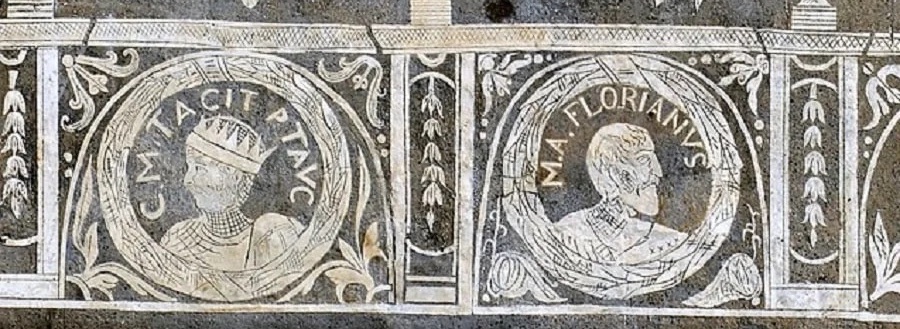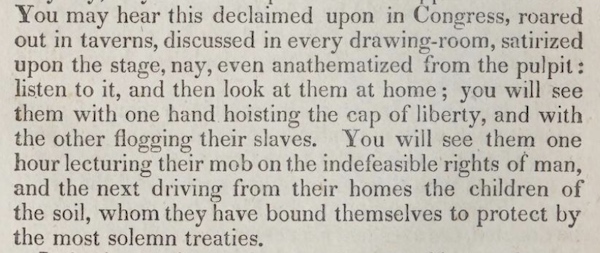A Brief but Bigoted History of “We're a Republic, Not a Democracy” (3 of 4: holy moly, an even darker back side of this semantic silliness)
History Could Use Some Context...
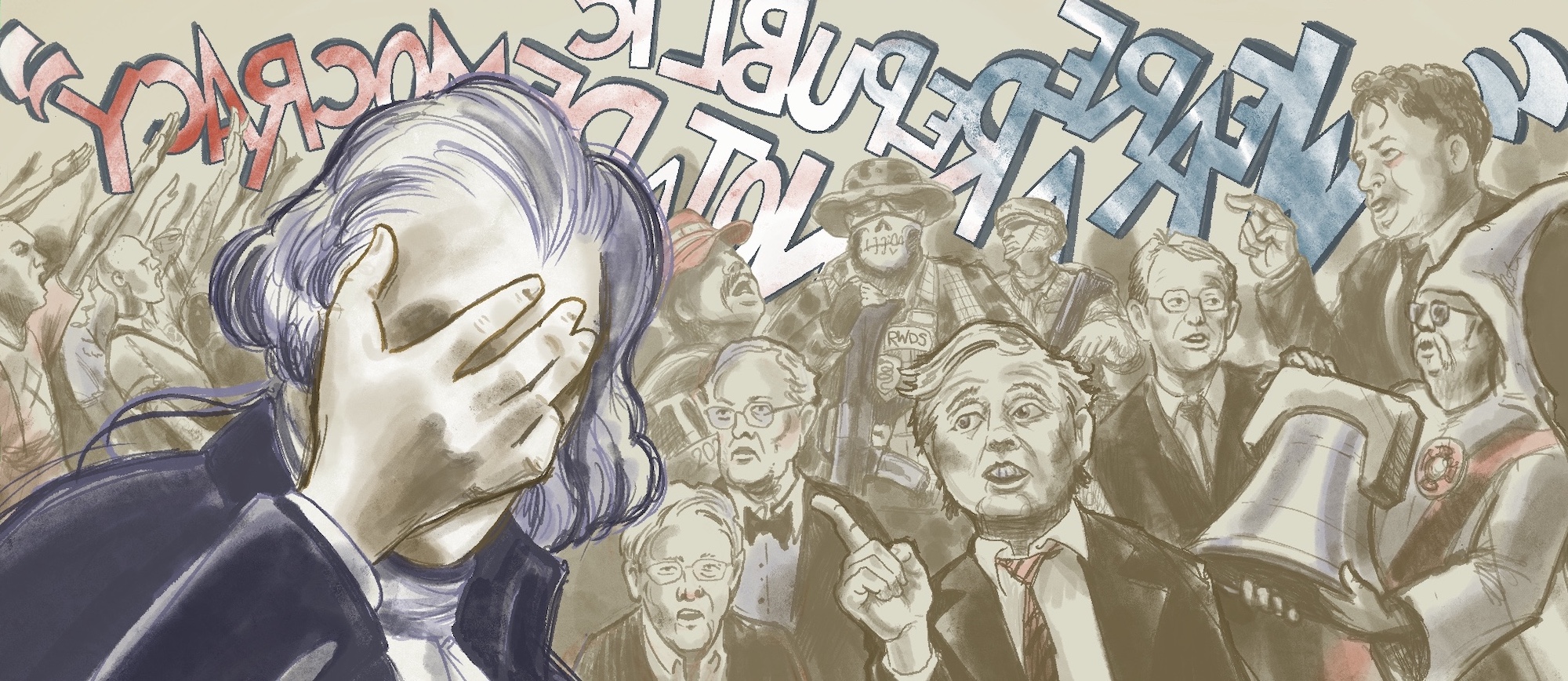
(looking for the beginning of this screed? try this)
Sincere apologies for making that first half so darned condensed. We were certainly not kidding about how much we had to get through. An online article is much too short of an avenue to cover the wacky ride “We Are A Republic, Not A Democracy” has taken through U.S. History. If there is a publisher looking for a book about political menaces hidden in innocuous-sounding bromides, please drop us a line, because it would take a hefty volume to properly dissect and reconnect all the nodes of reactionary zealotry sitting in the data and drafts on our hard drives. If we were to elevator-pitch it, we would describe it as a tale of an American aphorism told in the fashion of that “The Red Violin” film. But there is probably something more creative there than likening a cursed fancy fiddle to an old political slogan utilized by a series of historical characters to showcase their own plot arcs. Anyways…
In an attempt to make up for such an abbreviated chronicle of inanity, we have written this “backside” to add footnotes and some perspective on who kept the idiom in circulation, why they used it, and how Americans have, from the get go, smartly recognized it as clearly confused cover for glaringly blimpish anti-democratic machinations.
During fleeting parcels of spare time, we have been gradually piecing together a separate article intended to be a resource of “fun facts” about the Klan and other extremist far-Right hate groups’ influence & ties to mainstream conservatism. Specifically the white Christian nationalist kind and the political parties propelled by its perpetual bonfire of grievances. Going through the research, we noticed that the dictum “the U.S. is a republic, not a democracy” frequently popped up in literature & propaganda produced by segregationists, the KKK, the John Birch Society (JBS), and a myriad of white supremacist groups. Like a reflection of these groups’ broadly similar beliefs, the expression paired with conflations of civil rights and/or communism with democracy as a component of some sinister Jewish stratagem sneakily crafted to conquer the white Christian man, his culture, and the republic for which it supposedly stands.
We came across the story of Klansman Samuel Green calling in a favor from segregationist Georgia Governor Herman Talmadge to ban players like Jackie Robinson from playing at the Dodger’s 1949 Exhibition Games in Macon & Atlanta. While researching Talmadge we momentarily thought that we had found the publication that had kicked “We are a Republic, not a Democracy” *(which we will continue to abbreviate RNAD)* into quasi-popularity, his 1955 book You and Segregation.
We dug around to see if there were any other conversations about the phrase’s background and came across a Medium post recounting the same story of segregationist employment. It referred to Talmadge’s book as being the beginning of RNAD’s journey as well.
Further internet spelunking brought us to a 2019 New York Times concerning a lame social media spat between Alexander Ocasia Cortez and Dan Crenshaw over the Electoral College. In it, historian Nicole Hemmer recounted RNAD’s humble beginnings as a frame for anti-Roosevelt sentiments, as notable America Firster radio squawking-head Boake Carter wrote “The United States was never a democracy, isn’t a democracy, and I hope it will never be a democracy.” The article then mentioned the John Birch Society injecting it into regular right-wing parlance, where it has blissfully been embedded ever since.
Not a wholly incorrect explanation, but we were still left wondering how this historical and ideological bridge from Madison to the anti-FDR movement had been shaped. It seemed implausible that it was a sudden and pervasive epiphany for affluent conservative circles of the 1930s. Additionally, who were all the people and groups who had invoked it between then & now? Was it really almost exclusively used by the hard-Right that we kept running into? Or was this merely some cognitive bias on our part?
To answer our last question, we spent hours (nay, months) galore google-dorking around the internet combing through every public archive and website of government records that we could get our keyboard-callused hands on. We even looked into recent online documentation. In the first decades of the World Wide Web, the mention of RNAD was pretty rare, sometimes showing up in sketchy online forums and white nationalist “nationalist” websites.
Results of queries via Open Measures (previously Social Media Analysis Toolkit) suggest that mentions of RNAD were mostly confined to hard-Right networks, with big jumps whenever conservatives would have themselves an uproar over election losses (like the 6th day of 2021) or culture war manufactroversies had gone into outrage overdrive.
A great deal of time was spent scouring the Library of Congress for old broadsheets and journals going back centuries to see what these political discussions in the America’s neonatal years sounded like. But the essential key has been the Internet Archive, a wellspring of Congressional reports, FOIA requests, and all sorts of papers & books discussing misconceptions created by confusing semantics. The Internet Archive is an invaluable tool containing all sorts of scans of official documentation, as well as some exceedingly dark direct-from-the-source far-Right material containing information that can help pull the robes off of several white supremacist groups’ inner workings and connections.
To the point, we assiduously attempted to find examples of non-hardliners using RNAD, but it was a rarity to come across anyone using the buzzwords who was not already steeped in the fringiness. Of course there were invocations while complaining about FDR, conflating “democracy” with the Democratic Party, and railing against public schools. Some goofier examples were the few moderate and progressive Republican politicians incorporating RNAD in whingey criticisms of Roosevelt or Truman having too much unilateral power over the executive branch and other divisions of the federal government. A bit of an odd argument to see from the predecessors of the current promulgators of the unitary executive theory, a notion modern conservative nobility has been pushing for in order to give their president-of-choice autocratic-y control over the executive branch and other corners of the nation’s governance. Something that, like a Leopard’s Eating Faces Party themed misadventure, could majorly mess with those sacred states’ rights that they supposedly hold so dear.
But when you are on a farm that only grows the kind of cherries that conservatives find exceptionally tasty, then you are going to end up with an especially hidebound flavored harvest. So that is the fruits of our labor, an annotated timeline of the popularity of “we are a republic, not a democracy” with some of the worst people America has conjured up.
“democracy” according to long-dead blokes...
“They had just ideas of the value of personal liberty, but none at all of the structure of government best calculated to preserve it. They knew no medium between a democracy (the only pure republic, but impracticable beyond the limits of a town) and an abandonment of themselves to an aristocracy or a tyranny independent of the people.”
—Thomas Jefferson
All kinds of more eloquent thinkers have broken down these Republic and Democracy terms much more succinct than we could hope to, but we are going to go head and give it a go…
A straight-forward definition of “democracy” is a system of government by the citizenry “exercised either directly or through elected representatives”.
Similarly, the plainest contemporary definition of “republic” is a system of government ruled by the representatives of the citizen body. The modern turn of phrase refers to a system of government which ultimately derives its power from the people rather than from some hereditary monarch based on divine right.
Rudimentarily speaking, when the terms were brewed up by each of their respective ancient societal counterparts, both more or less held the same meaning. In 6th century BCE, the Athenians named their system of voting and representation “dēmokratia” (literally “people power”). The Romans later designated their Latin rendition “res publica.”
For an obvious albeit rather simple example:
The Greek word for “democracy” is “Δημοκρατία,” written in the Latin alphabet as “Dimokratía.”
One could double-check this with any translator site or app. If they translated the word “republic” into Greek, the result would also be “Δημοκρατία.”
Further to the point, the official English name of the nation of Greece is the “Hellenic Republic”. You can type that title into any translator and the result is “Ellinikí Dimokratía.”
Or “Ελληνική Δημοκρατία” in Greek.
The Roman's res publica” loosely translates to “public affair,” or more specifically “state.” (Plato's “Republic” or “Πολιτεία” translates to “State” as well) Res publica was essentially a Roman term for the Greek “Dimokratía” with similar intended characterics of freedom from arbitrary control by a monarch over political or societal affairs, along with some slightly updated concepts. Yet the Roman Republic was also not without its slavery, class conflict, massive lack of suffrage, and the risk of ominously familiar sounding literal Ceasers imposed on itself in order to “Save the Republic.”
Governing-wise, the Romans stood on the shoulders of their Greek antecedents, building on what had been created before. And sure enough, shrewdly using a different label did not necessarily cease the amount of despots and poor outcomes for Rome. Thanks to a senate deciding that it was in their best interest of the Roman citizenry to grant autocratic power to the winner of recent civil wars, Rome endured being instead ruled by emperors for the final 1,500 years of its existence. Maybe that is something to keep in mind when anyone attempts to lionize ancient republics in their awkward Appeals to Tradition.
While the Roman Republic’s governance was constituted by a wealthy senate and lower-ranked assemblies, a written “constitution” does not a “republic” make. Representation does not require free elections by the general citizenry. History demonstrates that the voice of the populace can have zero say and still be clearly considered a “republic.” In essence, an autocratic or despotic state could certainly be a republic as long as they were not considered a hereditary monarchy.
Zipping forward through history (Bill & Ted style) we would crash into the Enlightenment to witness the ancient philosophy & literature, architecture, and societal organizing of the Greeks being again en vogue with prominent European thinkers. The American colonists, ever the contrarians, followed a similar suit but would lean into a more Roman esthetic.
But, as historians Robert Dahl have pointed out and as our translator app says, there were veritably no real distinctions between the two terms until Madison were published in 1787 written as one of the Plubiuses (Publii? Publiusi?). Even his fellow novice-Americans had used the words interchangeably throughout the 18th-century. Many modern historians conclude that Madison simply “made it to discredit critics who contended that the proposed constitution was not sufficiently 'democratic.'”
Madison later disclosed that the “democracy” he had referred to was specifically a conceptual “pure democracy,” with no leaders and where everything is voted on by everyone. In order to sell it to those holding out on signing off on the Constitution (e.g., slave-states). The word “republic” had been utilized more for aesthetic reasons. Sort of akin to how “Spring Water” is a label slapped on a bottle of water in a store, but its content came out of a tap somewhere other than your sink.
Add to that, other than in maybe some quaint towns and enclaves, a “pure democracy” has never existed on any scale larger then maybe a neighborhood’s worth of people. Even Athenian democracy had various constitutions, assemblies, and halls of government which would resemble an ancient version of early-America where slaves, out-of-towners/immigrants, and women were cut off from participating in. Considering that the “birthplace of democracy” never even had a pure democracy, it is a bit disingenuous to infer “democracy” is synonymous with “pure democracy” when no society, not even the Greeks, has ever attempted a pure direct democracy.
Outside of thought experiments in the form of newspaper editorials, literally not a single person anywhere was talking about a desire for a “pure democracy” then or thereafter. Surely one could scour the social media landscape nowadays to come across some idealistic college freshman’s post to prove us wrong, but even the most direct democracies devised by humans, such as trade unions or Switzerland, have never expected to run like a pure unadulterated 100% democratic free-for-all. And as we will soon see, as we scroll downward, it is not like Americans were oblivious to what bullshit was being shoveled at them. Hamilton, for instance, had little trouble pointing out that the overuse of “pure democracy” to paint democracy as unstable was just a manufactured talking point of his fellow governing officiates.
A year earlier, Shay’s Rebellion had caused a bit of a panic in confederation’s shacks of government. Similar to Chris Rufo hunting down words in books he does not like to bolster his maufactroversies, “mob rule” and “democracy” as pejoratives used in a comparable manner by Madison. Following the publication of the Federalist Papers, some Framers like James Adams, would share similar attitudes. But, like Rofo’s re-framing of CRT, there had been a redefinition of the term “democracy.” A decade earlier, Adams had already written glowingly about how great it was that “every State upon the Continent has instituted a democracy, and that the people are universally fond of their new government..” Unfortunately, these semantics have clumsily muddied the waters, giving floppy ammo for some privileged people to fight against representation and suffrage for others ever since.
Despite contemporary goofballs using tenuous “Appeals to Founding Fathers” to argue against reforming the out-of-date electoral system by whipping out the RNAD-card, Madison had already contended in Federalist No. 39 that a representative republic is still 100% a republic even if its office holders were directly elected. He even made multiple appeals at the Constitutional Convention for a direct “at large” popular vote of the President as the “fittest” way to elect a President; something other developed democracy on the globe currently do with rarely such dramatic hiccups. Even so, from this present-day vantage point, it is rather nuts to cling so tightly to the words of oligarchical politicos of the past who casually supported slavery & property-owning requirements in regions like the South so much so that they decided against popular voting because it would be too disadvantageous for wealthy repressive slaveholders. At least Madison, a slave-owner, was perceptive enough to be aware of the hypocritically racist mess they had made.
(In all seriousness, a popular vote does not make a “direct democracy.” Nor does it make a government any less of a “republic.” For one, a president or any other branch of government would be superfluous in a direct democracy. And it would not give more populated states any more voting power [as some people myopically understand it] than smaller ones. If you or your friends think so, please take the time to consider that a “popular vote” would simply mean that literally zero state has more voting power than any other. Rather, every single vote would count equally to elect a person for the one office that supposedly represents every single person in an entire nation and not just a few swing states who received excessive campaign visits. Essentially, every Republican vote in California [and there is huuuuge amount of them] would be as consequential as ever Democratic vote in California or in New York, as well as those in Alabama and South Dakota. Ironically, the Electoral College has created the conditions for one of the main reasons some of the Framers made for creating the Electoral College — to not have the presidential election come down to who can get the most partisans out to vote in small handful of states.)
To give a sense of the vibes when the Federalist No. 10 article hit the newsstands, at the Pennsylvania ratifying convention in November 1787, James Wilson (a Madison ally, “the principal architect of the executive branch,” and one of the Constitution Convention’s most influential members), gave a lengthy spiel remarking that “three forms of government seem to have been correctly known, the monarchical, aristocratical, and democratical.” Ending with an “epic mic drop” proclamation that the Constitution they were about to ratify was “purely democratical.” and “In THIS CONSTITUTION, all authority is derived from the PEOPLE.”
S.O.P. stuff. For every “Madison/Franklin/Adams said Republic” quote, there were at least a dozen or more dialogues regarding the democratic nature of their new American experiment during this era, often from those same oratorical fancy fellows.
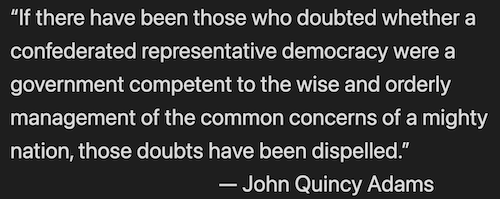
Others unquietly called attention to the inherent flaws they had just baked into their system. Heck, Alexander Hamilton's Federalist No. 22 advised against schemes like the electoral college that would “contradict that fundamental maxim of republican government, which requires that the sense of the majority should prevail,” as well highlighting the threats a tyranny of the minority and the duplicitous profiteering that their republican design would be predisposed to...
“One of the weak sides of republics, among their numerous advantages, is that they afford too easy an inlet to foreign corruption.” ... “The fabric of American Empire ought to rest on the solid basis of THE CONSENT OF THE PEOPLE. The streams of national power ought to flow immediately from that pure original fountain of all legitimate authority.”
Relevant to our RNAD tale, there is an oft quoted reply that Ben Franklin gave to being asked by a socialite, point blank, “What have we got —a republic or a monarchy?” His answer, “A republic, if you can keep it,” of course did not mention “democracy,” possibly because democracy & republic were commonly used interchangably and the word “democracy” was not an element of her binary question. Anecdotally, some in the colony-turned-nation were expecting George Washington to be made king. Or at least president-for-life. (John Adams advocated for addressing the President as “His Majesty”) The quick quip got itself a distinct patina after Dr. James McHenry publicized the anecdote 16 years later, rewording it and adding some extra lines to spin up political worry as part of the good doctor’s anti-Democratic/Jefferson propaganda. It probably would have remained in the forgotten files of history, but the tale was published in a reprint of McHenry’s journal a century later, a few years before RNAD began to really pick up steam. Decades later, the “A Republic if you Can Keep It” was revamped in print to make nugatory complaints about the Roosevelt administration. AFC member Robert “the New Deal is a Red Plot” McCormick's Chicago Tribune appropriated the story to contend that the Constitution was designed with the intention of preventing the spread of Communism.
Madison, a slaveholder, softened little in his support for the slavery-reinforcing 3/5ths compromise, but quickly came around to agreeing with the description of his new nation as a “democracy.” Furthermore, he recognized the incompatibility of slavery with democracy; which led him to realize that, like previous republican societies, much of the country, especially “the Southern States of America, are, on the same principle, aristocracies.”.
Evidently, the abstraction of “American democracy” is prone to being bogged down in semantics. Even worse, those tendentious interpretations of what a small crew of Founding Fathers had intended for the U.S. has been a mess from the outset. Americans could have done as most every other country does and update their legalese as it aged. Instead, nominal eggheads keep trying to reinterpret what America’s gentry pieced together 250 years ago through whatever ideological filter they learned about U.S. history through so that they can hang their “Originalist” placard on it. Rather eye-roll-y stuff for anyone who spent their last few months slogging through Constitution Convention transcripts and attendees’ correspondences talking about how they fully expected future Americans to rewrite a decent chunk of their by-the-seat-of-the-pantaloons edicts and clunky compromises.
Even Thomas Paine, known as “The Father of the American Revolution” with his rabble-rousing pamphlets, argued that it was preposterous to assume that any generation should rule themselves with statutes of past kings or parliaments. As in, there is no reason to stick with bygone eras’ laws when the people who wrote them were literally dust. Paine was no Enlightenment Era slouch. He recognized the stark reality that things evolve; society would not always be like it was in 1791, when he spent several paragraphs propounding on precisely this in Rights of Man...
And despite what neoteric talking-heads claim about the magic of republics with laws written on parchment, history has clearly indicated that whether a nation claims to be a republic, constitutional republic, representative democracy, or a direct democracy, having a constitution is not a magic shield to keep all the bad things at bay. There is literally no guarantee of keeping a constitutional government in any political system. As the Roman Republic exhibited and Thomas Jefferson pointed out, representatives and/or courts, elected by its citizenry or its high society, could still select tyrants or transfer power to one or more authoritarians, thus killing the whole project…
“democracy” in the 1800s was simply “democracy”
We have already shown that the debate over whether the nation was a republic or a democracy remained a rare one during the country’s pubescent period. Exceptionally famous in its time, Touqeville's De la démocratie en Amérique (Democracy in America) was a two volume analysis of why republican representative democracy had succeeded in the United States while failing in other lands. Touqueville shared what he had witnessed on his travels around the fledgling country and so his 1835 book became extremely popular and influential in the European educated classes. He expounded on the land he traversed, discussing its rather democratic nature and its “democratic republic” form of government. Madison, who by then had declared himself a Republican-Democrat, was a fan of the book as well.
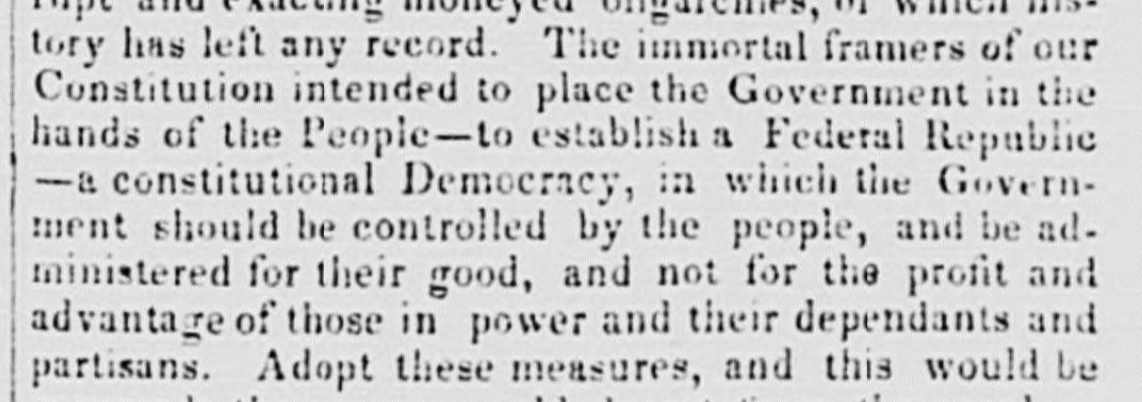
And so “democracy” organically grew into a frequent theme in newsprint throughout the first half of the 19th century...
”...the democracy of the republic will certainly march to certain triumph in the coming contest.” ”...the Republic is what our democratic creed recognizes.”
...often used within the same sentence as “republic” to describe the United States. Even in xenophobic warning about granting too much voting power to Americans, especially newer arrivals.
As the impending civil war crept closer, the founders of the Republican Party repeatedly describe the republic as a “democracy” that they endeavored to preserve. The label consequently appeared far & wide in anti-slavery broadsheets. Seriously, it was such a quintessential theme with the new pro-abolitionist party that they explicity wrote it into their original political platform:
Despite Calhoun's anti-federalist agitation a few decades prior, arguments still appeared nonexistent when Lincoln described the U.S. as “a constitutional republic or democracy- a government of the people by the same people” in a July 4th, 1861 speech to Congress or when sharing his opinions in his writings...
“As I would not be a slave, so would I not be a master. This expresses my idea of democracy. Whatever differs from this, to the extent of the difference, is no democracy.”
—Abraham Lincoln, 1858
Things carried on much the same after the war. Republican-aligned newspapers continued to publish editorials agreeing with what has been previously pointed out...
Sometimes blatantly...
And sometimes a bit Madisonian...
Although not all that scientific, we even took a gander at the timeline of “republic” and “democracy” appearing in literature using a simple Google Books tool. Leading up to the Revolutionary War, “republic” was a popular output of English-speaking print-houses. It remained so, but slowly lost its luster until “democracy” overtook it as the modern era took hold. Since the early 1900s, “democracy” became the common term of usage, while “republic” fell out of favor. In the end, we should assume that most authors are probably simply using their era’s common lingo for and not get ourselves too up in arms over pedanticism and semantics. Do what you will with this titular data…
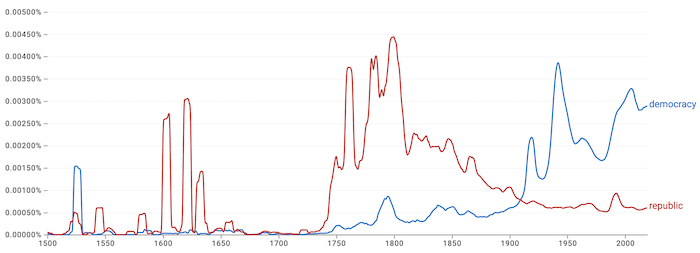
Unplanned Backfiring of Historical Pontifications
The beginning of the next century likewise persisted...
More than 100 years after its founding, describing the nation in both manners continued with many remarking that, for all intents & purposes, they were conceptually the same and the “republic,” as laid out in the “original constitution as drafted by the patriots of the first convention,” was humbly a “representative democracy.”
The inclusion of women’s voting rights and other electoral reforms, such as referendums and direct election of Senators, bolstered the expanding democratic norms in the U.S. Likewise, other nations around the globe were embracing increasingly open and fairer societal vibes. Dying spasms of traditional monarchistic imperialism manifested in an autocratic Germany and Austria-Hungary marching Europe into a Great War with little regard for any choices of their citizenry. Consequently, Congress was asked to help defend the popular descriptor in Wilson’s request to support and join the other Entente Powers. Although showing up a bit late in the game, the U.S. teamed up with democratic allies France and Great Britain in a high-cost victory over obsolescent aristocratic establishment-ism.
But for RNAD, a spoke had recently been unintentionally yanked off the wheel of what seemed a mostly settled matter, thanks to progressive historian Charles A. Beard’s 1913 An Economic Interpretation of the Constitution of the United States. The central argument was that the U.S. Constitution was in fact a component of a counter-revolution to financially benefit wealthy landowners and creditors of the Revolutionary War. According to the historical records, the same drafters of the nation’s founding documents had confiscated land during the war for themselves. He recounts how the war had unleashed radical democratic currents in the common people, but the Constitution was structured to tamp them back down. According to Beard, the authors of The Federalist Papers, representing their own interest group, convinced the monied landed class holding legislative power to stay the course, called “Republic,” for fear of a “mob” that democracy was feared to devolve into. But as it turned out, farmers, debtors, and the plantation owners politically pushed back by establishing “Jeffersonian democracy” in 1800.
For the ensuing decades, academics and historians adopted his exposition. The legal community, on the other hand, did not tend to agree. And primarily for patriotic reasons, by the Cold War, much of it was essentially thrown out. But sharing his interpretations and analysis had unintended consequences, as one particularly privileged group re-appropriated Beard's class conflict theory for their own anti-working class messaging. Wealthy elites of the 1920s essentially went “Ah, we actually agree that the US was originally set up as a republic to be administered by those such as us.” As noted in Part 1, arguments were made that the masses should leave all the rule-making up to the politicians they had been funding. The growing momentum of organized labor movements, striving for better representation and fairer outcomes, were viewed as a hindrance to the return to the Gilded Age that they pined for. So they inherently took the simple step of propagating the notion that democracy was congruent with the socialism that the elites categorically despised.
Beard had a hand in kicking off some unintended consequences for sure, but two other books hit shelves soon after to unabashedly inject maximum racism laced with RNAD straight into conservative politics. These pseudo-intellectual treatise would inspire some of the most detestable groups of people to come down the pipe of the twentieth century. They also configured the familiar fear-mongering racial rhetoric mainlined into global Right-wing politics that we are presently witnessing.
Eugenicist Madison Grant's 1916 book The Passing of the Great Race combined America's simmering racism and anti-immigration sentiments to foster fears of a “race suicide” for his conceptualized loftier-ranked “Nordic race.” This was the substantive inception for the “white replacement” conspiracy theory that has dominated hard-right politics over the last century.
Grant's book begins by declaring that “the greatest danger which threatens the American republic” is “the gradual dying out among our people of those hereditary traits through which the principles of our religious, political, and social foundations were laid down, and their insidious replacement by traits of less noble character.” He goes on to ponder imagined racial skull shapes, argues that slavery is actually a good thing for “lesser races” to learn how to work since whites were evidently designed too brainy yet too feeble to work in the fields, and warns that democracy inhibits societal progress because it is simply too equal to maintain without being led exclusively by an elite lily-white class.
Pseudo-scientific statistics from Madison Grant and his book were used to compose the incredibly racist Immigration Act of 1924 and justify Jim Crow laws for decades to come. The book was so widely embraced by chauvanistic thought-leaders that Teddy Roosevelt and Adolf Hitler both incorporated its content into their own political policies. (Hitler even wrote Grant a letter to tell him “This book is my Bible.”)
He was even more explicit in his article, “Discussion of Article on Democracy and Heredity”, about the “equality” of democracy being, in his opinion, an enticement for immigration in order to pollute the American whiteness. The melting pot was alledgedly already a failure by 1918 and only being made worse by “democracy.”
Grant's racialist “Nordicist” doctrine directly bred most of the panicked white-resentment based idealogies that have followed since. He wrote the introduction for his disciple Lothrop Stoddard's The Rising Tide of Color Against White World-Supremacy, one long caterwaul about percieved threats of non-white colonies and non-white “mongrels” living in white countries which would lead to a collapse of civilization because democracy had opened “the flood-gates of anarchy” to weaken the white race. And as in paranoid reprints of Ford's Protocols of Zion and propaganda from white supremacist groups throughout the 1900s, the America First movements & their spin-offs, and current accounts that the owner of X-Twitter revels in boosting, according to Stoddard, the diminishing of white power was declared a Jewish and Bolshevist plot.
On further-Right edges, white supremacists and their normalizing apologists have quoted & praised Grant and Stoddard for highlighting democracy and universal suffrage as the root of their imagined “white genocide.” Some of it being handily mainstreamed by those who made careers out of spreading and building on the eugenecists' work, like Roger Pearson who effortlessly hobknobbed with Republican presidents as a member of the JBS and the Heritage Foundation. Other times it furtively shows up in promotions from think-tanks, 24-hour news pundits, or social media posts as “voter replacement” or “Cultural Marxism.” A little too on the nose, Madison Grant had provided seed money for the Pioneer Fund, the eugenicist endowment with an unsettling amount of crossover with the Libertarian™/traditionalist New Right and its alt-Right progeny.

Through ill-defined terminology, a version of the argument had been laid out that the fortunate Anglo-Saxon/Nordic status quo was embodied in a “republic,” while everything that could possibly threaten it was personified in “democracy.” But before the America First movements scooped up and ran with RNAD, prominent industrialists and anti-labor groups, such as the Liberty League and the DuPont-funded National Association of Manufacturers led by Henning W. Prentis, demonized President Roosevelt’s New Deal as the opening salvo of a Semitic-led socialistic class war against the Republic that never materialized. Red Scares had already created suppressing effects, but these kinds of campaigns to replace the use of “democracy” with “republic” in public discourse and the education of American children were ramped up.
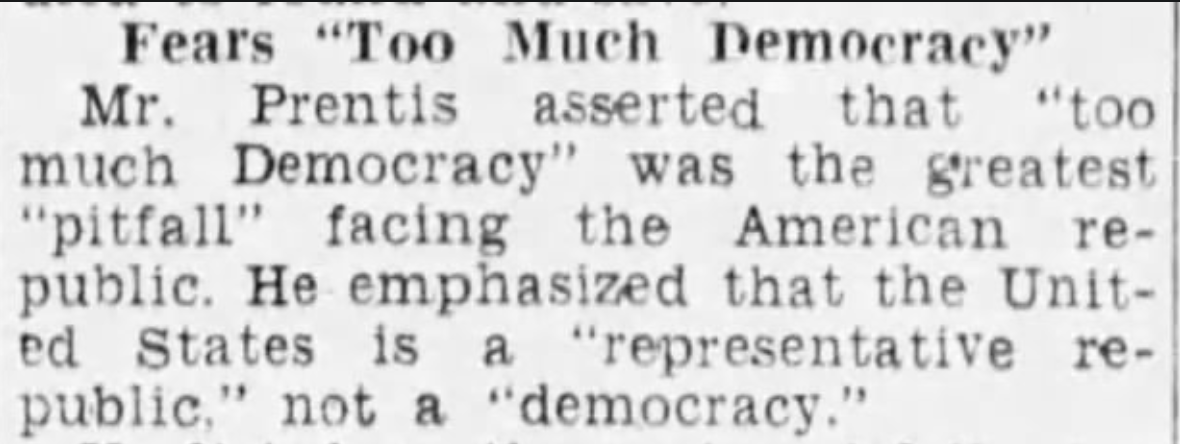
On an America First related note, we could not find that Boake Carter quote referenced in the New York Times as an early appearance of RNAD. But Carter certainly propagandized for them on his radio show and “Jew-baiting, Fascist-minded” nazi-apologist Congressman Jacob Thorkelson (R-MT) was big enough a fan that he enjoyed sharing and reading aloud Boake Carter columns in Congress...
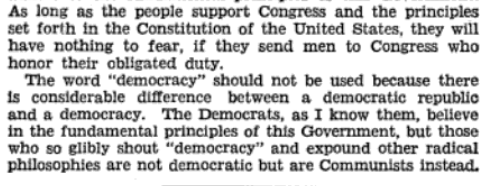 (FUN FACT: Thorkelson also opposed accepting Jewish refugees as World War II began, claiming that Jewish migrants were part of an “invisible government” which was tied to the “communistic Jew” and Jewish “International Bankers.”)
(FUN FACT: Thorkelson also opposed accepting Jewish refugees as World War II began, claiming that Jewish migrants were part of an “invisible government” which was tied to the “communistic Jew” and Jewish “International Bankers.”)

Noticeable Neo-Nazi & Bircher Overlaps
Financiers, industrialists, and various moguls unsubtly spread anti-labor propaganda with a respectable coating of anti-civil rights and antisemitism contingent on what margins of accepted discourse they could get away with; sprinkling in RNAD to marginally make their messaging more palatable for average-America.
There were enough bona fide connections between outspokenly conservative magnates, their corporate boards, and unsavory far-Right associations over the last 100 years that it is difficult to not notice the same names of men popping up again & again in members-lists, newsprint, and fulfilled FOIA requests. Clever businessmen were able to generally stay out of the spotlight. Fortunately for researchers, historians, and journalists, their funding, friends, and attendance at particular meetings nevertheless would frequently give them away. There is so much more to showcase than we are able to present in these articles. If we ever undertook writing a proper book, this would be the most in depth and entertaining part of the task. But for now, we will just keep presenting our cursory findings forming a humongous pile of shady fash-friendly characters being shady and fashy together.
Merwin Kimball Hart (R-NY) was a lawyer, politician, and insurance executive who founded the “National Economic Council” (NEC), a lobbyist group seeking to limit governmental influence in the aftermath of the 1929 economic collapse. As is custom, Hart also believed that the New Deal was un-American and that Communism had survived the first Red Scare to entrench itself throughout the country. Him and his ideas flawlessly fit into the tycoon-supported America First Committee's program. Although publicly claiming not to be a fascist, Hart visited Francisco Franco and lauded the dictator for his violent suppression of trade unions & socialists in Spain. On his return, Hart wrote America, Look at Spain, which persistently linked Communism with “democracy,”, admonishing any use of the nefarious word by American politicians.
NEC meetings regularly involved members of the German American Bund and analogous fascist groups of the 1930s and 1940s. Hart would enthusiastically share his “The Alien Influence in Our Midst” speeches, declaring “it is time to brush aside this word ‘democracy.’” In the 1950s, he would use the NEC's bimonthly Economic Council Letter to attack liberal causes and portent that the U.N. was utilizing “the illegal immigration of perhaps a million European and Asiatic undesirables” for the “socialization of American industry” and to “bring all American life under absolute domination.” (a persistent thread in modern far-Right and militia groups) The Letters were a heap of some of the first and deepest holocaust denial with claims that the death of 6 million Jews was impossible, blaming of World War I and the Russian Revolution on the Jews, and yammerings about how America's support for the State of Israel will take the U.S. republic down.
Following the Second World War, Hart and like-minded business owners slapped together the American Action Committee, the first explicitly Right-wing political activist group, to “defend” the U.S. against perceived domestic “enemies” through polished-for-middle-America reactionary politics. American Action were developing the explicit lines from the America First movements through the Birchers and on to the Right-wing think tanks of today; fusing burgeoning militant Libertarianism with pernicious anti-immigrant/communism/labor by helping congressional electoral campaigns of conservative candidates and promoting the repeal of federal spending and regulations. Hart unsurprisingly became the lead chairman of the New York chapter of the John Birch Society.
Robert E. Wood, head of Sears Roebuck and co-founder of the America First Committee, was pivotal in building Hart's new organization, using close relationships with conservative congressmen and industrialists to the organization's advantage — a beneficial relationship of familiar faces who had been intimately involved in the America First clique. American Action was almost indistinguishable from the rising Foundation for Economic Education and NEC, as its membership and money also came in from higher-ups at Sears, Union Carbide, Sante Fe Railroad, Sun Oil, EF Huton, the Pews, General Motors, the Volker Fund, and especially the DuPonts.
Coughlinites and related collaborators, whose influence would continue onward into the incoming far-Right American politics, joined the unprogressive group alongside support and alliances from notorious conservative celebutantes such as “Judge” George Armstrong, George Deatherage, Allen Zoll, Conde McGinley, Joseph P. Kamp, and Robert H. Williams. Wealthy industrialist and member of the NEC's executive committee, Russell Maguire, would transform the American Mercury into a white supremacist digest; Charles Coburn, the prolific actor and anticommunist activist and later an honorary member of the white supremacist White Citizens Council; and Verne P. Kaub, an avowed “nationalist conservative” and associate of Hart & Buckley who would later collaborate with Willis Carto's far-Right Liberty Lobby, all spent considerable effort building American Action, which bolstered their own white power projects. Much of the financial connections extended through these individuals, groups, and beyond to have a considerable affect on developing the contemporary conservative movement's direction over the last half century.
Case in point: Klan organizer, prolific producer of antisemitic literature, Texas oil tycoon, and another RNAD-regular mentioned in Part 1, “Judge Armstrong,” was one of Hart’s most significant financial supporters. He was sitting on so much money earmarked for bigotry that he attempted to endow southern colleges with boatloads of cash if they would remove non-white & Jewish students and adopt a strictly white supremacist curriculum. Utilizing his oil-tycoon wealth, the Judge Armstrong Foundation was created to endow southern colleges with boatloads of cash if they would remove non-white & Jewish students and adopt a strictly white supremacist curriculum. Utilizing his oil-tycoon wealth, the Judge Armstrong Foundation was created to specifically fund related white-embittered segregationist and “Libertarian™” projects. His foundation has been a consistent contributor to a considerable collection of contemporary Right-wing think-tanks/activists carrying on the conservative tradition of constant culture war. A very abbreviated list of recognizable beneficiaries includes the Heritage Foundation, Federalist Society, Freedomworks, Christopher Rufo's Claremont & Manhattan Institutes, Media Research Center, Cato Institute, Foundation of Economic Education, Mises Institute, Prager University, Hillsdale College, Turning Point USA, Pacific Legal Foundation, and a wide array of other consortiums conformably wrapped up in the Atlas Network and/or the State Policy Network (both which the Armstrong estate also directly funds).

Tracking back the other way through one of the Armstrong estate's renowned benefactors, the Heritage Foundation, a think tank founded by the dominionist Federalist Society/ALEC-creator Paul “Moral Majority” Weyrich and Joseph “a little bit right of Attila the Hun” Coors (two enthusiastic dues-paying Birchers), we get to see some recognizable faces and themes. We have already noted Heritage’s regular plugging of RNAD to go along with segregationists and Nazi-fanboys that the conservative-king-making conglomerate welcomed as board members and project contributors. Apparently, they also never tired of employing the same ol’ trustees of past Firster factions and their far-Right-er offshoots who joined the think tank from boardrooms at Chase Manhattan Bank, Dow Chemical, General Motors, Pfizer, Sears, Mobile, and a pack of chums from the American Enterprise Institute.
Straight out of the gate, Heritage associated with those dressing up immoderate reactionary grievance machinations in tailored suits & gaslit neckties. Roger “never found a nazi he didn’t like” Pearson, William F. “neo-nazi career starter” Buckley, Peter “alt-Right piggybank” Thiel, Sam “neither slavery' nor racism' as an institution is a sin” Francis, Eileen “handicapped kids should rely on God instead of being a drain on taxes” Gardner, Ernie “apartheid is worth it so the Reds don't threaten my funding” Lefever, Tony “our anti-gay campaigns are bolstered by klan voting lists” Perkins, and anti-civil rights Congressman Ben “tenants should be publicly hung if they fall behind in rent” Blackburn (R-GA) are just a few characters to get us started.
Outside of its propaganda campaigns for the tobacco industry and against anything hinting at public health regulations, un-ironically proposing a national health care scheme in the 1990s that became the framework for the Affordable Care Act they stoutly loathed two decades later, and other forays to pull the GOP rightward and away from popular mainstream platform policies, there are all sorts of tedious listicles to be made of Heritage's inanity, associations, and authoritarian fetishism. But we really should carry on addressing more contemporary matters. As in, literal on-American-doorsteps stuff that reflects the vein of autocracy that these spouters of RNAD are arranging…
 A Brief but Bigoted History of “We're a Republic, Not a Democracy” (4 of 4): selling autocracy through pseudo-intellectualism & mic drops
A Brief but Bigoted History of “We're a Republic, Not a Democracy” (4 of 4): selling autocracy through pseudo-intellectualism & mic drops

